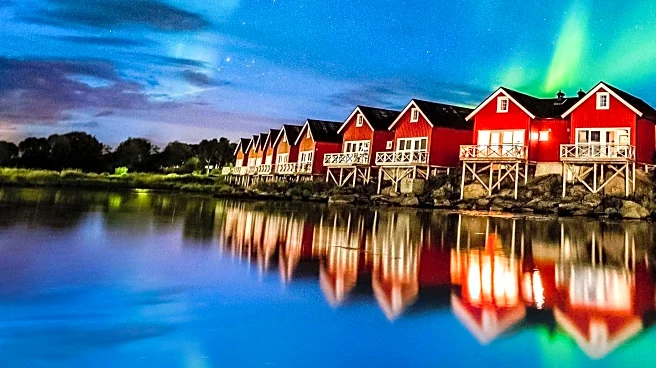What's Happening?
The upcoming aurora seasons from late 2025 through early 2026 are expected to coincide with heightened solar activity, presenting an ideal opportunity for wellness-focused travel. This period is marked
by increased chances of witnessing vivid auroras, particularly in the Northern Hemisphere. The guide highlights the benefits of experiencing the northern lights, such as stress reduction, mood enhancement, and improved sleep, due to the awe-inspiring nature of the phenomenon and the dark-sky environments that promote digital detox and mindfulness. The guide also provides practical advice on where and when to travel for optimal aurora viewing, emphasizing locations with low light pollution and clear horizons.
Why It's Important?
The alignment of heightened solar activity with the aurora seasons offers a unique chance for travelers to engage in wellness tourism, which is gaining popularity for its holistic benefits. The experience of witnessing the northern lights can significantly contribute to mental well-being by fostering a sense of awe and connection with nature. This trend could boost tourism in regions known for aurora sightings, such as Alaska, Northern Canada, and parts of Scandinavia, potentially benefiting local economies and promoting sustainable travel practices. Additionally, the emphasis on wellness during these trips aligns with broader societal shifts towards health-conscious and mindful living.
What's Next?
Travelers interested in aurora-focused wellness trips should monitor real-time space-weather forecasts to plan their visits during peak aurora activity. The guide suggests building buffer days into travel plans to accommodate potential weather delays and emphasizes the importance of supporting local communities and Indigenous guides. As the solar cycle progresses, travelers can expect continued opportunities for aurora viewing into early-to-mid 2026, with short, powerful bursts during active periods. This period is seen as a final window before solar activity trends down later in the decade.
Beyond the Headlines
The ethical considerations of aurora tourism include respecting local communities and minimizing environmental impact. Travelers are encouraged to tread lightly, reduce light and sound pollution, and dress appropriately for extreme cold to ensure safety. The guide also highlights the importance of managing expectations, as aurora visibility is dependent on weather and solar conditions. By promoting responsible travel practices, the guide aims to enhance the sustainability of aurora tourism and its benefits for both travelers and host communities.









